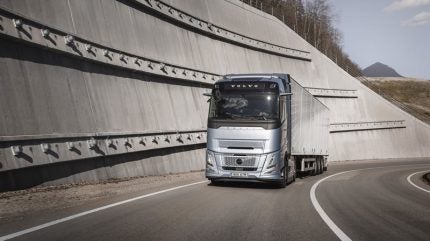
Volvo Trucks has developed what it claims is a world-first – for heavy-duty vehicles – stop/start engine technology to save fuel and CO2.

Discover B2B Marketing That Performs
Combine business intelligence and editorial excellence to reach engaged professionals across 36 leading media platforms.
The latest addition in Volvo’s striving for fuel savings is developed in-house at Volvo and is based on the company’s existing I-See and I-Roll technologies. The new stop/start engine feature is enabled by constantly monitoring road data and road curvature information. The engine will be turned off temporarily when an oncoming downward slope is identified along the route. While the engine is turned off, zero fuel will be consumed and consequently, there will be no CO2 tailpipe emissions.
“Our engineers have done it again – innovating a new engine technology that contributes to making transport by truck more fuel-efficient”, says Jan Hjelmgren, Head of Product Management, Volvo Trucks. He continues: “As part of our decarbonization strategy, we will continue to innovate to make our combustion engines even better and to reduce our impact on the environment.”
The new engine stop/start functionality is activated at speeds above 60 km/h. Depending on enabling conditions such as topography and ambient temperature, the new I-Roll with Engine stop/start will be able to cut up to one percent of fuel and CO2 emissions on top of already achieved savings. Together, Volvo’s many innovations represent significant efficiencies and a positive impact on emissions from transport, as well as running costs for the operator.
The new feature will be offered on the Volvo FH and FH Aero with 13-liter diesel engine and customers can order it from November 2025.
Volvo Trucks’ strategy for decarbonization includes combustion engines powered by renewable fuels, battery-electric and fuel-cell electric trucks.




